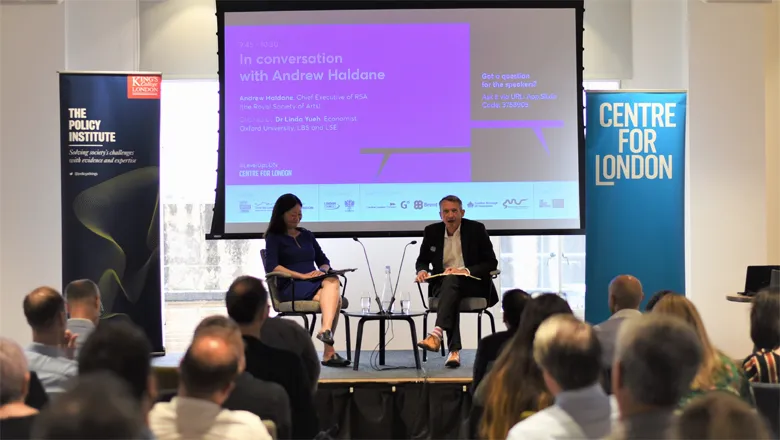Whatever policy that’s introduced now is put through the "levelling up" filter.
Andrew Haldane, Chief Executive of the Royal Society of Arts
12 July 2022
Former Bank of England chief economist Andrew Haldane speaks at King's College London
Policy Institute co-hosts event discussing the history of levelling up and what it means for London

The day after he was appointed Chair of the government’s Levelling Up Advisory Council, Andrew Haldane, former Bank of England chief economist, discussed the “levelling up” agenda at a Centre for London event hosted with King’s Policy Institute, explaining its history, significance, and implications for London, as well as expectations for how the policy area is likely to develop.
Haldane, who is a visiting professor at King’s and now Chief Executive of the Royal Society of Arts, outlined that regional inequalities – for some time side-lined as a political issue – were now being brought into focus and incorporated into wider policy decisions.
Throughout the discussion, Haldane aimed to cover not only the challenges that levelling up presents in a country with a centuries-old economic divide, but also make recommendations as to how the levelling up agenda could be focused and improved.
One of his proposed recommendations was to focus more on "crowding in" private monies, using public money as seed funding to create a place that the private sector is then more keen to invest in.
Our conception of the role of public monies in levelling up needs to change. This is really about asking what amount of financing is needed by government to crowd in those private monies.
Andrew Haldane
Emphasising that levelling up should not be seen just as a private endeavour, Haldane said that the public sector also has a role to play, such that it becomes a collaborative exercise between actors across the community:
There are huge pools of private capital out there. There’s £3 trillion in UK pension funds, a very small faction of which is given over to local projects, to making good on levelling up. Finding means of unlocking more of those private sector monies is a crucial part of this.
Andrew Haldane
Haldane also noted that, by 2030, any region of England that wanted a devolution deal could have one, and such a region would be entitled to powers at or approaching the levels of the Greater London Authority. At the same time, he highlighted that London includes some of the highest areas of multiple deprivation in the country, and stressed that one of the powers key to resolving this would be fiscal devolution, both in London and elsewhere: allowing devolved public sector bodies to set taxes as well as spending.
Thinking about contemporary issues, Haldane suggested that the levelling up agenda presented its own unique solution to the cost-of-living crisis, by offering scope for expanding local economies and enhancing people’s experiences in their immediate area, allowing their challenges to be addressed “hyperlocally”.
In the face of the cost-of-living crisis we need a new economic plan for the UK. My response to that is – we’ve got one. Levelling up is a national economic plan, but led locally, rather than centrally. If we put that into overdrive, we absolutely could rekindle growth in people and in places at speed.
Andrew Haldane
Beyond the discussion on economics, Haldane stressed that it was just as important to level up wellbeing as it was to tackle the productivity challenge; to be able to look beyond general statistics of economic performance and observe the lived experience behind them.
